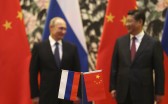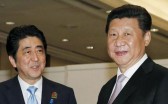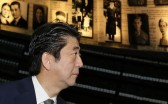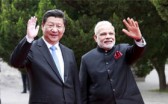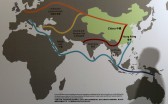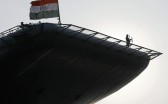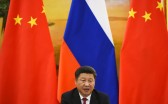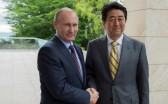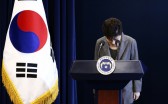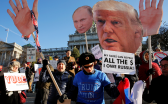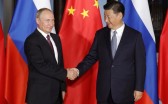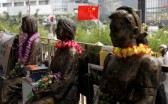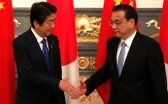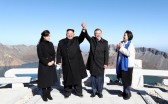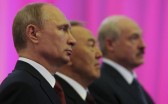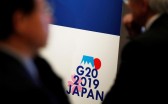As the fiftieth anniversary of Japan’s defeat in the Asia-Pacific War approached in the summer of 1995, the Japanese Diet debated a resolution, which, it was hoped, would lay the ghosts of the past to rest. The aim was to present a national statement of memory and remorse, broadly supported across the political spectrum and addressing the concerns of the victims of Japan’s imperial expansion, but instead of becoming a moment of reconciliation, the resolution proved to be a crucial missed opportunity. Twenty years on, it is worth looking back at its failure, because it highlights one key reason why the “history problem” remains such an intractable stumbling block to better relations between Japan and its neighbors. As we look ahead to the next years of Abe’s leadership, we need to be conscious of the forces driving him and Japan’s conservatives to raise sensitive historical themes, which damage Japan’s international relations, including with China, where sensitive historical memories are also inextricably bound up with today’s foreign policy.
In 1995, it became obvious that the divisions within Japan about memories of the war were so deep that no meaningful statement of those memories could win a substantial majority of votes in the Diet. The Communist Party, sections of the Socialist Party, and some members of other parties insisted on a resolution, which frankly acknowledged and deeply apologized for the harm done by Japan’s imperial expansion and aggression. Within the conservative Liberal Democratic Party (LBD), on the other hand, there were some who refused to countenance the idea that the resolution might even mention the words “colonialism” or “aggression.” After a divisive debate, the compromise wording of the resolution became extremely brief and vague, referring to “many instances of colonial rule and acts of aggression in the modern history of the world” and acknowledging that Japan had been responsible for some of them, but failing to provide specifics of time or place, and failing to include the word “apology.” Even so, less than half the members of the Lower House voted in favor of the resolution, which passed only because many members absented themselves. Among fifty plus LDP parliamentarians who refused to vote for it because it went “too far” was Abe Shinzo.
Partially compensating for the failure of the 1995 resolution was Prime Minister Murayama Tomiichi’s personal fiftieth anniversary statement expressing “deep remorse” and “heartfelt apology” for Japan’s wartime aggression. But this promptly triggered a counterattack from the political right, condemning such a “masochistic” view of Japan’s past. The result was the rise of a new right wing movement, operating both outside and within the Diet, demanding more overtly nationalistic history education. Abe Shinzo was a central figure in the Diet wing of this movement. Japan is a democratic country with freedom of thought and expression, and so it is natural that many interpretations of the past should flourish side by side. But the fact that such profound divisions persist at every level of society on such an important question of national history makes any attempt to resolve historical differences with other countries fraught with difficulty.
Why is Japanese public memory of the war so divided? The reasons are complex, but at least part of the story goes back to the immediate postwar occupation era. Sections of the US occupation authority established an energetic program to “re-educate” the Japanese public about the evils of militarism. Yet at the very same time (as we now know from declassified US records), the intelligence branch of the occupation was re-employing unrepentant senior officers from the wartime military to collate the archive of Japan’s war documents and, in effect, write the history of the war. As a result, while sections of the postwar Japanese education system presented a highly critical view of Japan’s wartime past, a contrary view that Japan had nothing to apologize for became entrenched at the heart of the political establishment. These divided views of history have survived to the present, and recent rightward trends in politics have strengthened the influence of those who belong to the second camp.
This helps to explain the phenomenon that some observers have termed Japan’s “Jekyll and Hyde” approach to the past. Some prime ministers, including Murayama in 1995 and Koizumi Junichiro in 2005, have offered statements of apology for wartime wrongs, but the power of these statements has always been eroded by simultaneous contradictory comments or acts by other senior politicians. Koizumi’s sixtieth anniversary statement followed Murayama’s in expressing apology for Japan’s wartime aggression, but its positive impact was weakened by the simultaneous decisions of several senior ruling party politicians to commemorate the war’s end at the Yasukuni Shrine to the war dead, where executed Japanese war criminals are also enshrined. One of the most prominent of these was Abe Shinzo, who was elevated to the position of Chief Cabinet Secretary two months later.
It is, therefore, no surprise that the profound division in Japanese war memory should have haunted Abe’s statement marking the seventieth anniversary of the end of the Asia-Pacific War in August 2015. In the lead-up to the anniversary, a number of leading historians and some opposition politicians again called for a clear and unequivocal apology for wartime wrongs. But Abe himself was on record as having opposed the “masochistic” view of the past represented by the Murayama statement, and many of his supporters expected and demanded a reassertion of Japanese “national pride.”
Abe’s response to this dilemma was to create a handpicked committee to compose a report on Japan’s twentieth century history. Strangely, this sixteen member “committee of experts” contained only one scholar who might be described as specializing on modern Japanese history. The committee’s report provided the basis for a lengthy and deftly-worded statement which included the contentious words “colonialism,” “aggression,” “remorse,” and “apology,” but embedded them in a narrative entirely different from that of the Murayama and Koizumi statements. According to this narrative, Japan’s expansionism began in 1931, and was primarily a response to pressure from other imperial powers, which had pushed Japan into “economic and diplomatic deadlock” by creating their own economic blocs. This is historically misleading, ignoring the entire history of Japan’s imperial expansion before the 1930s. Other contentious issues were also buried in ambiguous general statements: the history of the “comfort women,” for example, dissolved into the statement that “the dignity and honor of many women were severely injured during wars in the twentieth century.” The Abe statement papered over the rift in Japanese public memory of the war, but it does nothing to resolve the underlying issues. It has given heart to Japan’s revisionist right, whose leading figure, Fujioka Nobikatsu, pronounced himself “very relieved” by Abe’s choice of words.
Of course, East Asia’s conflicts over history are not the fault of the Japanese government alone. At a time when a rapidly changing regional power balance is creating tensions and uncertainties, all the governments of the region have found it impossible to resist the temptation to play the “history card” in their diplomatic dealings with one another. The use of history as a stimulus for nationalism was most recently on display in Beijing in China’s seventieth anniversary victory day celebrations. Although Chinese leader Xi Jinping, like Abe, committed his country to work for peace, and China used the occasion to announce a reduction in its troop numbers, the celebrations were above all an overt and massive demonstration of military power. In South Korea, too, political leaders facing declining popular support have all too readily turned to history to inflame nationalist sentiments, as illustrated by Lee Myung-bak’s controversial visit to the disputed territory of Dokdo/Takeshima.
A central issue is the determination of the Japanese government (as Abe has put it in the past) “to escape from the postwar regime.” This means both undoing the critical views of Japan’s wartime history introduced into the postwar education system (the so-called “Tokyo Trials view of history”) and removing the restrictions on military expansion imposed by Japan’s postwar peace constitution. Abe’s seventieth anniversary statement has been accompanied by energetic moves within Japan to undo the critical stream of postwar memory of Japan’s wartime past. References to events like the fate of the “comfort women” have been removed from textbooks, while teaching about Japan’s ownership of the contested territories of Dokdo/Takeshima and the Senkaku/Diaoyu Islands has become mandatory. The Ministry of Education and Science is even considering a policy of encouraging state universities to close the humanities and social science faculties altogether, further undermining the teaching of history in Japan. How can such policies ever produce a meeting of minds between Japan and its Asian neighbors or other former wartime adversaries?
Meanwhile, the Japanese government has pushed ahead with its new and vaguely worded security legislation which will allow the Japanese military to be deployed overseas for “collective self-defense” purposes. This is unpopular with the electorate and has sparked some of the largest protest demonstrations seen in Japan in recent years, but the disarray of the Japanese political opposition means that there is no obvious prospect of a significant change in policy in the next couple of years. The Chinese response to these moves has so far been muted, but profound mutual mistrust remains. In the short term, there is hope that a possible three-way summit between Japan, China and South Korea might ease regional tensions. But in the longer term, the underlying stance of the Japanese government plays into the hands of the most hawkish sections of the Chinese political and military establishment, who use the image of an unrepentant Japan to boost the cause of their own country’s military expansion. So the vicious cycle of nationalism continues, with troubling consequences for East Asia as a whole. As China’s, and the region’s economy enters a period of increased instability, the temptation for all of East Asia’s governments to distract public attention from the fundamentals by mobilizing history for nationalist ends will surely increase. Seventy years on, the prospects for a resolution of Japan’s, and the region’s, “history problems” look as remote as ever.

